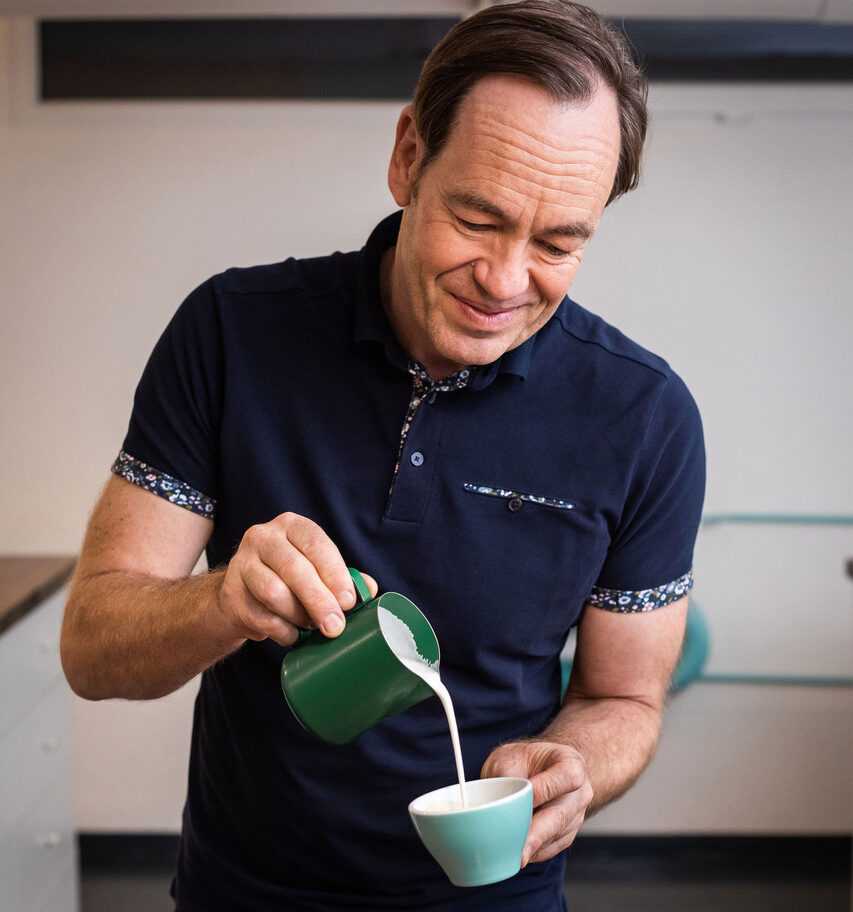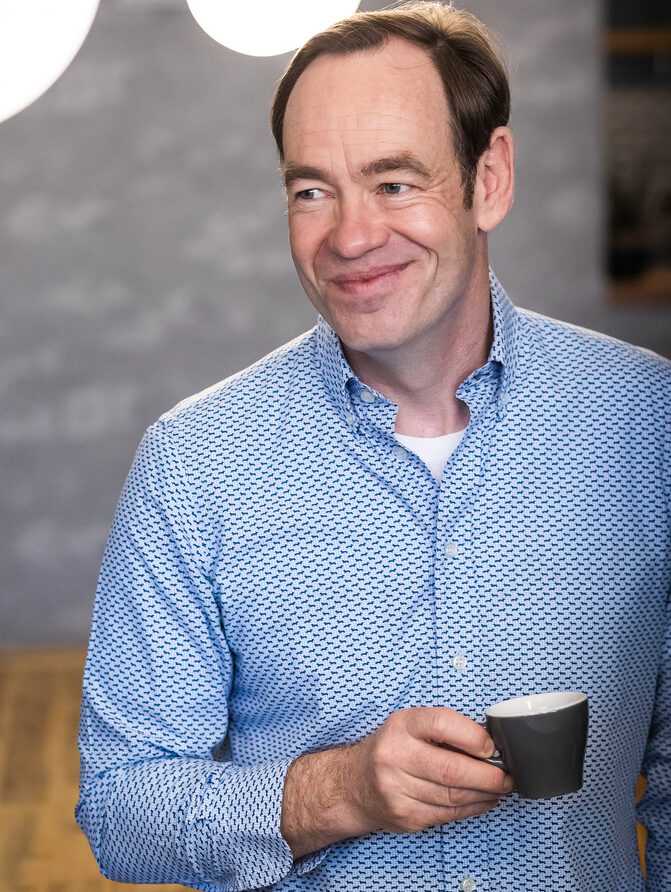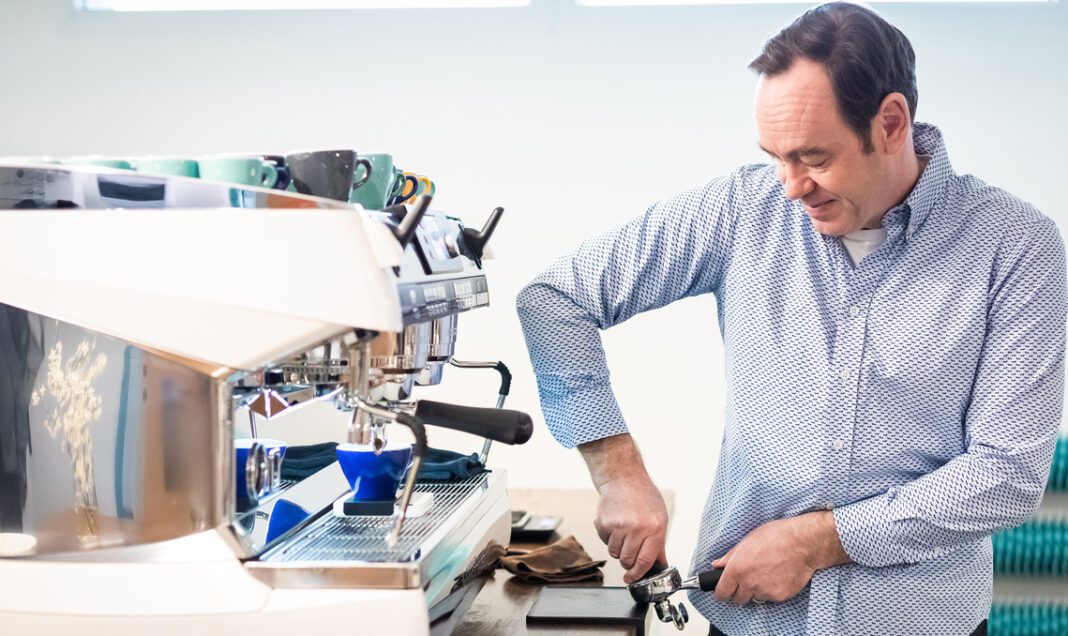MILANO — Gwilym Davies is a famous name in the specialty scene, being one of the first experimenters to ride the famous Third Wave. He started to work with coffee in 1996 and in 2009 he won the World barista champion. After that, Gwilym Davies opened Prufrock coffee shop in London, now co-owned with Square Mile Coffee. He is also authorized trainer of SCA (Speciality coffee assn.) and Barista Hustle.
Since 2013 he has lived in the Czech Republic where he opened his own training centre with a focus mainly on giving classes. And in 2018 he opened with Petra a roastery called The naughty dog. That’s quite all of your long professional career. And now, let him speak.
Davies, you are a champion barista, trainer and roaster, coffee is your daily bread: which role do you feel or have you felt most gratified by today?
“I am a barista. At my core I enjoy making coffee for someone & being a positive part of their day. My role has developed into training and roasting, but I still do it through the eyes and focus of a barista, so during training I put an emphasis on consistency, speed, waste reduction and customer needs. When roasting I always have a focus on how the coffee will extract and how the barista will use the coffee. I am biased but I believe experienced baristas make the best roasters.”
How has the speciality coffee scene evolved since 1996? Is it still a niche product?
“The speciality coffee scene is no longer niche, it is still developing in parts of the world but in major cities like London it dominates and it’is now the mainstream. It has become huge, much bigger than I could ever have imagined and it is still growing. Of course, as a scene grows the core values become diluted, norms and behaviours are more fixed which
are attractive to followers rather than creators. There are still niche products within the speciality scene: some are novelty, some are self-limiting by price, but others will develop and become part of the specialty mainstream. But maybe there will be a new generation of progressive coffee rebels who will push us once again and makes us irrelevant, I hope so.”
With Davies, a pioneer from the start, we will try to make some predictions. First of all, let’s talk about Geisha: while Indonesian Geisha is a hot item at auctions, varieties such as Eugenoides and Liberica are more popular at world competitions: what do you think?
“Geisha is still a very popular Arabica variety in competition and was part of the blend Colombian Barista used to win the WBC . But as you say species other than Arabica are being explored with Eugenoides being very popular in the top places at the World barista and brewing competitions held in Milan. Eugenoides has always been of interest to baristas as it is most probably the parent plant, along with Canephora, of Arabica and is known for its low bitterness and high sweetness.
I cannot see Eugenoides becoming a regular drink outside of competitions as it is a low yielding plant so is expensive to produce Liberica used by Hugh Kelly the Australian competitor who took 3 rd place at the WBC was more of a surprise. Liberica is generally not known to be high scoring as a speciality coffee. Hugh used it as part of a blend with Eugenoides in his milk drink and sees the potential of new fermentation techniques to change how we view Liberica.
Including Arabica and Robusta there are 130 recognised coffee species so there are plenty more to explore, they are however more likely to be used in cross breeding rather than drinking as most apparently do not taste good at all. One species that shows promise is Stenophylla which was recently highlighted by every barista’s favourite taxonomist, Aaron Davis.”
With regard to the increase in the price of raw materials and the difficulties in transportation, do you think this is a trend that will last for a long time, will it be reversible, what impact will it have on the supply chain in the future?
“We cannot expect the supply of coffee seeds to our Roasters to be constantly easy and cheap. The idea of seeing cheap coffee as our right has a history based in colonisation and enslaved people. Coffee is an incredibly low cost product with a complex supply system where the cost has been below the true cost of production for most farmers for many years.
Once we accept instability we can adapt around it and get creative with how we market, transport and store coffee. This is a big topic that needs its own article, my own thoughts have been inspired by blogposts and comments by Christopher Feran.”
Have you, as a coffee shop and as a roaster, been affected by this difficult situation?
Davies: “It has been a problem with the supply of some products for the café and a noticeable reduction in quality of metal and electronic parts of certain brands. As a roastery we have had a delay in green coffee which has meant our supply has been difficult to plan and put pressure on cashflow. We have had to be inventive in how we deal with coffee both with increasing shelf life of green and effective methods to roast older green coffee than we normally would. We have learnt a lot and I am sure we will have to learn more. And of course, everything has gone up in price.”
And has Prufrock Coffee weathered it and how is it reacting between Covid and Brexit?
“It has been tough. Prufrock took the time during lockdown to have a large reconstruction so at least we look pretty. We have been following the guidelines and trying to remain flexible and adjust as needed during the last 2 years. It is a constant learning curve that both us and our customers are on Brexit has meant our coffee supply from European Roasters is a more expensive and always a mystery as when it will arrive. “
How much do you sell an espresso for, Davies?

“£2.60. This is served as a double espresso, as are all the espresso-based milk drinks. It works in London, but I am a single espresso drinker both straight or in a milk drink. If the milk drink needs 2 shots to be balanced, then it is too big for me.”
Is trained staff a problem in the UK? In the Czech Republic, how is the figure of the barista seen?
“Yes, as the specialty scene grew it became harder to find trained baristas. I am happy to train a barista for the job, finding a person who wants to work in hospitality is the key. Being able to pour world class latte art is nothing compared to a genuine smile and desire to make a good coffee. As specialty was growing a lot of barista skill was instinctive but over the years, we have created a standard technique that is easy to teach.
How the figure of a barista is seen depends on the venue most speciality cafes are owner operated by young people wanting to create something special so the barista is key to that experience.”
How is the coffee culture in the Czech Republic? Is specialty coffee very popular?
“The Czech Republic has a history based on the grand cafes of the Austro – Hungarian Empire then was influenced by Italian café culture it almost completely ignored the American 2 nd wave companies leaving a solid base for the younger generation who embraced specialty coffee.
There are wonderful cafes all over the Czech Republic with over 50 specialty cafes in Prague alone that I would happily recommend to travelling coffee lovers and barista champions. The split between the ‘sour coffee’ of specialty and ‘regular’ coffee is about 50/50 mostly separated among generational lines. Sadly, for companies supplying regular coffee the number of customers is decreasing every year while the Sour coffee drinkers are having babies.”
We know that Davies work with The Good Coffee Society in Vienna: do you supply many other coffee shops around the world?
“Mostly inside Europe, outside of Europe becomes more complicated and expensive. We supply multi-roaster cafes that either place small regular orders or have us intermittently as a guest coffee. It is nice to have the international contact with cafes, there are some very lovely people out there.”
A curiosity: we have noticed that many coffee champions have gone on to become coffee roasters…what goes through the mind of someone who wins a world championship?
“I cannot speak for all of them but the first thought a few of us had was how little we knew despite being world champions, winning however opened many doors which made learning easier. Coffee is one of the most important factors for a barista, so it is natural for them to take more control of the product by developing into roasting. There is only so much technique, machines and a smile can do, the key is to understand green coffee and the roasting process.”
Edy Piro told us about the first years he defined as “experimental”, when all together you explored the specialty wave: what can you tell us about those times? Is that spirit still there?
“We made many mistakes, sometimes we left the audience behind, and often we divided the coffee establishment. We had very little money and not much business sense, but it was about creating something new and fresh. We were excited about what coffee could be and we wanted to make the coffee as tasty as we could in an environment that showcased the coffee and where it came from.
There was a wonderful spirit among the people involved, it was about growing the market, learning, and discovering together. It was a fun time but what took us many years to discover I can now teach in 1 training day. The spirit is still there but it is not so experimental in the cafes and roasteries, the energy and ideas are coming from home users not directly involved in the industry. People like Jonathan Gagné who has written
one of the best coffee books on filter brewing I have ever read. Home users have always been a key influence from the early days, providing; ideas, experiments, and information on sites such as homebarista.com which baristas put to use in cafes and machine manufactures in factories. “
What are you currently roasting, what is the coffee you would like to work on one day?
“We sell single origin coffee and rarely do a blend, most of our coffees are seasonal Dry (Natural) processed with some classic washed coffees that last well as green seeds: Ethiopia, Kenya and Colombia. We also have been purchasing some coffee that have been kept in a low oxygen environment after being picked and before they are dried, these need careful sourcing as I like the acidity and the chocolate pralines but not so much when it tastes of cheese.

I have really been enjoying roasting the Colombia Ethyl Acetate Decafs as they are so easy to control it makes it easy to play with them. I would like the opportunity to roast dark and work with C. canephora. Just like a barista should know how to use a Cezve/ Ibrik, a lever machine and a single basket in a portafilter, as a roaster I will never consider myself good at my craft if I only roast one style and 1 species. I am also fascinated by Canephora as a species even though I am not so excited by the taste.”
Davies, do you have direct contact with the growers? Which ones?
“We do not buy directly from farmers, we rely on creating a relationship with importers, they have more of a cultural understanding of coffee growing communities, purchasing knowledge, logistics and cashflow than us. We are good at roasting and putting stickers on bags so that is what we concentrate on. I have visited farms and know farmers but that is because coffee is a hobby of mine not just work. For my work there is no way I can justify spending that much time, money, and environmental impact visiting farms.”
As a roaster, have you thought about and do you plan to sell coffee in capsules as well, since this is a particularly attractive market, especially now that the on-trade is struggling, and domestic consumption is growing? What do you think of pods and capsules, of portioned coffee in general?
“Capsules are incredible, so convenient to use and purchase. No grinding, no mess, no skill. It would be wonderful to buy a great coffee and roast it as soon as it lands from the boat then seal it away in 6g capsules, so it stays fresh until the next year’s crop. Capsules are just not my thing though; I like James Hoffmann’s old analogy with vinyl and digital music. We know vinyl is better, but we still stream our music due to convenience. I like vinyl and I will be around serving the customers who feel the same.”
What can we expect in the near future from your many activities?
“I will be mainly walking my sausage dogs in the Bohemian forests around Prague. It is time to be quiet, the longer old school third wave voices hold the platform the less space there is for better more relevant ideas to develop. At work I will be quietly getting better at my roasting craft and keep being an advisor to Barista Hustle when they need me. “
















